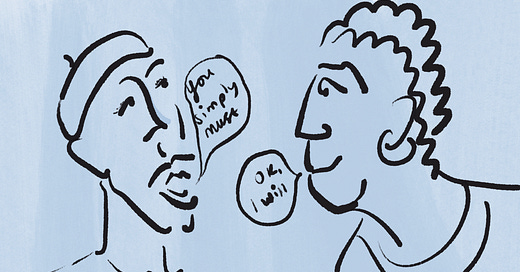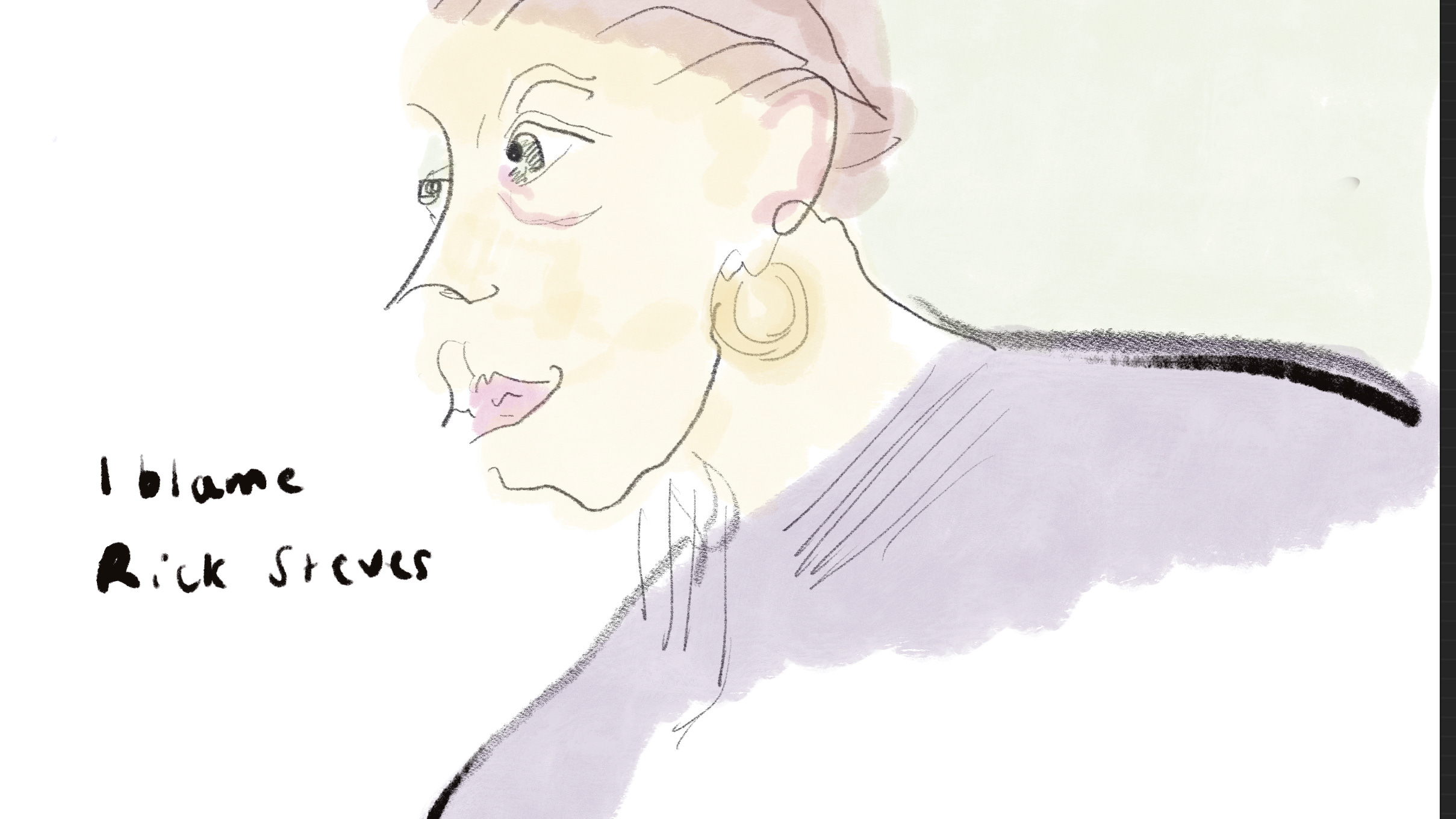‘Holiday’ is an untranslatable word
A weekly letter from Paris, straight to your virtual doormat.
Let’s get the introductions out the way
Dear friend,
I am delighted to start our correspondence with this first letter of Pen Friend. I’m Hannah Meltzer, a journalist and writer from London, who’s been living in Paris for the last five years.
When I was at school, I had a French pen friend named Eloise. We wrote each other two-line notes that consisted mostly of illustrations—stars drawn in shiny gold gel pens, stick-figures depicting our friends, things like that.
When we finally met on a school trip to Picardy, our ability to communicate was minimal, but I do recall being delighted at the dolphin-themed alarm clock she gave me. Rightly so: it must have been a from a top-drawer novelty-alarm-clock shop because almost 25 years later, it lives on, in perfect working order, on a bookshelf at my mother’s house.
My love for France started that day, and, like the clock, it has kept ticking. I learned French and now live and work in Paris, where I write articles for newspapers and magazines and write and produce content for non-newspapers and magazines.
This letter is for:
Anyone who loves, dreams of or has any kind of strong feelings about Paris and French culture;
and/or anyone likes the idea of having a pen friend.
These missives will provide you with updates, cultural insights, anecdotes and recommendations for Paris—exhibitions, interesting people, beautiful places, that kind of thing.
And/but I also want to go a bit deeper than macarons and the Eiffel Tower. I hope to avoid clichés, or unpack them, and to help explain the societal, structural, dare I say it, philosophical, reasons why French culture is how it is.
We’re still going to keep things fun, so while I want to go deeper than Emily in Paris, we’ll go less deep than, say, Michel Foucault. Expect somewhere in between those two.
To continue tradition, I will also illustrate my letters with my own drawings.
I would be honoured if you agreed to be my pen friend. And of course, you can write back. Even better, you can gift me a dolphin alarm clock.
“Holiday” is not a translatable word
It took me a few years to realise that ‘holiday’ or ‘vacation’ is not a good-quality translation for ‘Les vacances’, the French word for the summer break. This is because the two concepts are not the same thing.
When I, a British woman, think of “holidays”, the following images spring to mind: Cliff Richard, a bus, a bucket and spade, a slightly blustery beach, a board game, a campsite, an annual leave request, some kind of internet booking site.
In fact, though I can’t claim to represent all British people (nor would I wish to), I think these last two are quite important because I would venture to say that a holiday, for the Brits, is a lot about the process. I would go as far as to say that the following occupy just as much mental attention, if not more, than the break itself: the annual leave request, the out-of-office, the outfit shopping, the packing squares, the breakfast at the airport.
I think this is because in British culture, taking a week off work is seen as a bit MAD. It’s almost like living a fantasy, a celestial dream right here on Planet Earth. It’s not normal. It’s a big deal. It’s a process. When it’s over, we come back, maybe share our photos, assess our often meagre tans, and then return to the natural order of things, that is to say, the routine of working life.
A spontaneous drawing on the subject of tourism, Hannah Meltzer
Whereas, I would argue, in France ‘Les vacances’ represent a return to a natural, lizard-like state. This idea crystallised for me when I asked French co-workers how their summer holidays were, and they replied with phrases like: “Super! We had beach, sun, swimming, good food,” adding “tout ce qu’il faut”, or ‘all the necessary things’. As many others have pointed out before me, for the French, pleasure is the point. The point of life and the point of interesting conversation.
(I wrote about this idea during the first Covid lockdown for Telegraph Travel, when I saw that the local shops considered ‘essential’ included pastry shops, artisanal chocolatiers and even a truffle emporium.)
It took me a while to realise that while in a British office, we bond by talking about the ins and outs of work—so much so that we continue talking about them well into the evening—in French culture, social Brownie-points are earned by conversationally basking in the leisurely elements of your life.
This was a transformative realisation for me. When a French person asks about your holiday, they do not want to hear you talk it down, or worse, say you don’t have any booked at all! Above all, they do not want to hear about the logistics of it. For future reference, you must look them in the eye and tell them with a wistful far-away expression what you have planned for your summer break, followed by the words “ça fait du bien” or ‘it does you good’. They will nod, smile and agree, and you will seem human to them.
If you don’t actually have time away planned, just say you do.
What do you think about holidays? What do you think of the French attitude? What do holidays mean in your culture? What do they mean for you personally? Let me know!
Paris Tips
Great things to do in Paris in summer heat
Go visit the Chateau de Rosa Bonheur, the former home of one of the most successful French artists of the 1800s, who has generally been left out of the canon. Unable to study at the Ecole des Beaux Arts because she was female, Rosa Bonheur forged a singular path for herself, instead studying painting at the Ecole du Louvre by making copies of great works. She loved animals and made them her subjects, controversially going on location to sites like horse markets to capture her four-legged models—an activity considered wild and unbecoming for a woman! Her work became very commercially successful, particularly in the US and UK, so much so that she became the first woman in France to buy a chateau with her own earnings. The house in question, on the edge of the Fontainebleau Forest in a little village called Thomery, has been transformed into an enchanting museum, tea house and bed and breakfast by a lifelong local, the dynamic Katherine Brault and her daughter Lou.
Chateau de Rosa Bonheur
And/or, head to Musée Albert Kahn in leafy Boulogne-Billancourt on the western edge of the city and travel the world for the cost of a metro ticket. The newly renovated museum displays some of the first-ever colour photography and has beautiful gardens and greenhouses, including a jaw-dropping Japanese garden.
Early colour photos at Musée Albert Kahn
Holiday reading
While on my holidays, I read Sorrow and Bliss by Meg Mason and Notes of a Native Son by James Baldwin. I bought both books while also navigating my suitcase and dog at Euston Station. The harried shop assistant told me that he was being made to do food safety training even though his bookshop did not sell any food. He seemed stressed.
I couldn’t put down Sorrow and Bliss. Notes of a Native Son had me underlining a lot of passages in pencil and writing in the margins because, sadly, no that much has changed in terms of inequality.
What are you reading?
Well, that will do for now. I hope you enjoyed this letter!
I’ll write to you next week and will no doubt talk a bit about the sister of Les Vacances: La Rentrée. It’s the French September reset that lets you start your year entirely afresh (maybe it’s a Catholic thing? TBC next week).
Thanks for being my Pen Friend!
Yours,
Hannah
www.hannahmeltzer.com
https://www.instagram.com/hannah.meltzer/







